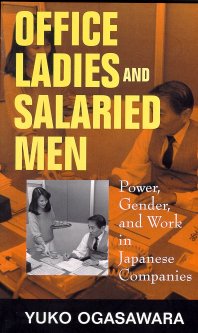
Office Ladies and Salaried Men

The subtitle for this book is "Power, Gender, and Work in Japanese Companies", and is by Yuko Ogasawara.
The book examines the lives of "office ladies", women who have positions somewhat like secretaries in the U.S. but with lots of extra duties added.
The book begins by noting the very strong patriarchal nature of the Japanese society. Women are considered to be second-class citizens, basically. Women in the workplace face discrimination beyond what women in the U.S. do, and it's much, much harder for them to get promoted and advance to management positions.
Yet, that doesn't mean that they are entirely powerless, either, and the type of power that they have is the focus of this book.
One primary difference between Japanese married women and American married women is the strong control of the finances that Japanese women have. It's quite common for the husband to hand his paycheck over to his wife and she, in turn, basically gives him an allowance.
One of the main points of the book is that men, in the workplace, are very strongly bound by expectations of their behavior. They are evaluated, are expected to do after-hours socializing, have to be concerned about their part in the decision-making, and so on. This all works to determine when, and if, they will get a promotion.
Women, on the other hand, are not promoted anywhere nearly as often. The office ladies are usually not even evaluated and are not bound by any of the other confining limits that the men find themselves in. This, in effect, gives them a considerable source of power. It's sort of the saying "if you ain't got nothing, you got nothing to lose" concept. The office ladies exert their pressures basically behind the scenes and in non-overtly obvious ways.
This apparent powerless also allows women to complain more, and it becomes important to the men to do what they can to keep the women mollified. The men can end up with negative evaluations if it's perceived that they can't control their own office ladies and keep them working happily. The women, on the other hand, face no such problems; they can also quit virtually any time they want. Many still live with their parents, so their finances are not as critical as it would be for American women living alone.
The tasks the office ladies do include the typical secretarial-type things like running the copier, doing word processing, answering telephone calls and sometimes doing basic accounting activities. That much is virtually the same as American secretaries.
The difference lies in the other expected activities of the office ladies. They are also expected to make tea, clean their own desks, run errands for their bosses and so on. Such things would be considered sexual discrimination in the U.S., but in Japanese offices they are expected behavior.
Main Index
Japan main page
Japanese-American Internment Camps index page
Japan and World War II index page
|